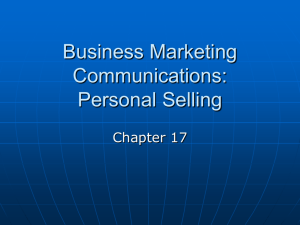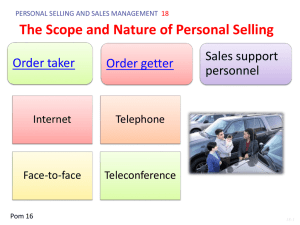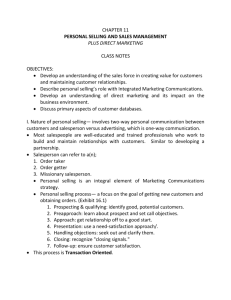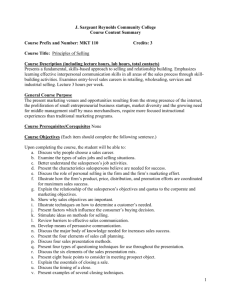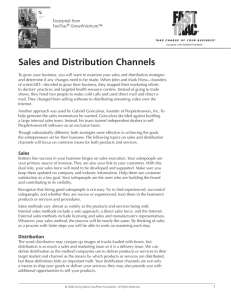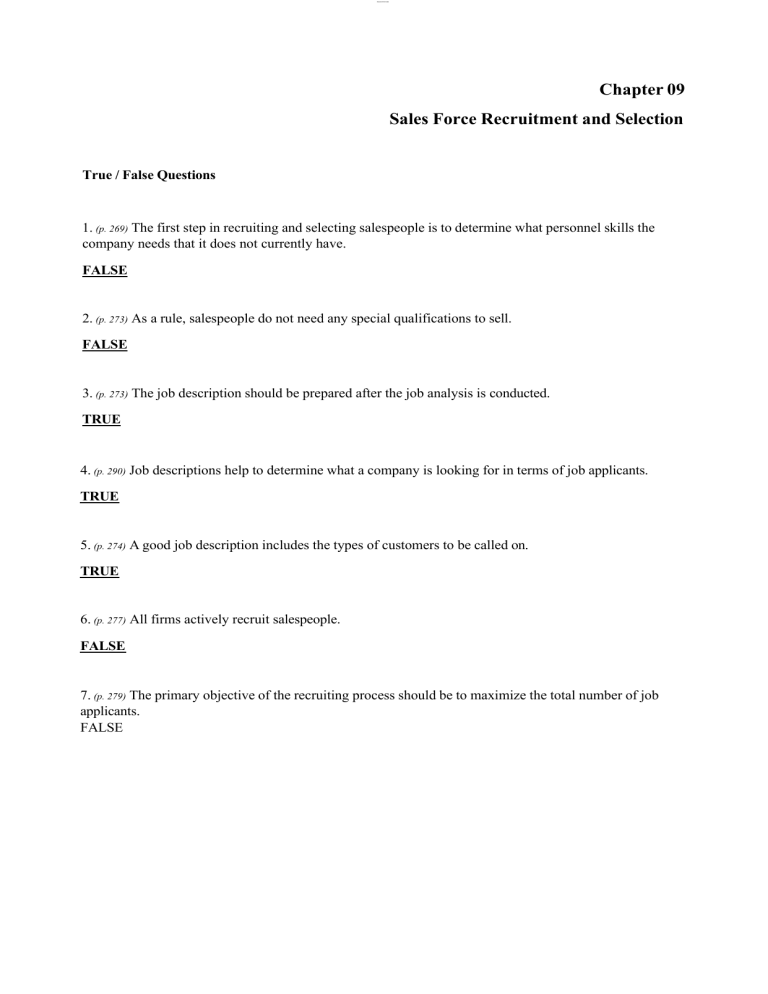
lOMoARcPSD|16744998 Chapter 09 Sales Force Recruitment and Selection True / False Questions 1. (p. 269) The first step in recruiting and selecting salespeople is to determine what personnel skills the company needs that it does not currently have. FALSE 2. (p. 273) As a rule, salespeople do not need any special qualifications to sell. FALSE 3. (p. 273) The job description should be prepared after the job analysis is conducted. TRUE 4. (p. 290) Job descriptions help to determine what a company is looking for in terms of job applicants. TRUE 5. (p. 274) A good job description includes the types of customers to be called on. TRUE 6. (p. 277) All firms actively recruit salespeople. FALSE 7. (p. 279) The primary objective of the recruiting process should be to maximize the total number of job applicants. FALSE lOMoARcPSD|16744998 8. (p. 280) People in a company's production, accounting and human resources departments are poor candidates for sales jobs. FALSE 9. (p. 282) Newspaper advertising is the primary external source for job applicants. TRUE 10. (p. 281) Customers can be an excellent source of sales recruits. TRUE 11. (p. 282) Employment agencies are a good objective source of sales personnel. FALSE 12. (p. 283) Junior colleges and vocational schools are poor sources of recruits for sales jobs. FALSE 13. (p. 283) Junior colleges and vocational schools are particularly good sources of recruits for sales jobs that require reasonably well-developed mental and communications abilities, but where advanced technical knowledge or a four-year degree is not essential. TRUE 14. (p. 284) The most valid predictor of how well a job candidate will perform his or her job is the job interview. FALSE 15. (p. 286) The most commonly used tool for selecting a new salesperson is the reference check. FALSE lOMoARcPSD|16744998 16. (p. 285) The methods of conducting personal interviews can be classified as either structured or unstructured. TRUE 17. (p. 286) There is evidence that job candidate evaluations based on personal interviews are the least valid predictors of subsequent job performance. TRUE 18. (p. 287) Because physical examinations are relatively expensive compared to other selection tools, most sales managers choose not to use them. FALSE 19. (p. 287) Tests for measuring specific abilities and characteristics of a job candidate have questionable reliability and validity. TRUE 20. (p. 290) Title VII of the 1964 Civil Rights Act forbids discrimination against people ages 40 to 70. FALSE 21. (p. 290) A firm should not ask a person's race or religious preference during a job interview. TRUE 22. (p. 291) A firm can ask about past convictions but not arrests. TRUE lOMoARcPSD|16744998 Multiple Choice Questions 23. (p. 269) The first decision that must be made when recruiting and selecting salespeople considers: A. Who will participate in the process B. Whether the job description needs to be updated C. Setting salary parameters D. Where to find the job applicants E. Which selection tools will be used 24. (p. 270) Because of the cost and time involved in recruiting and evaluating candidates for sales positions, the goal should be to A. Maximize the number of candidates B. Attract only external candidates C. Attract only internal candidates D. Attract a few good candidates E. Choose only candidates who live near the home office 25. (p. 270) After determining who will participate in selecting new salespeople, the next decision is A. Setting salary parameters B. Whether the job description needs to be updated C. Who has the authority to make hiring decisions D. Where to find the job applicants E. Which selection tools will be used 26. (p. 270) The four steps in the decision process for recruiting and selecting salespeople include each of the following EXCEPT A. Find and attract a pool of applicants B. Develop a mission statement C. Develop and apply selection procedures to evaluate applicants D. Establish policy concerning responsibility for recruitment and selection lOMoARcPSD|16744998 27. (p. 272) Primary responsibility for recruiting and selecting new salespeople for a firm is: A. Determined by the industry in which the salesperson will sell B. Always resolved by the head of the company's human resources department C. Dependent upon the size of the sales force and the kind of selling involved D. Dependent upon the number of applicants expected for a job opening E. Determined by federal anti-discrimination legislation 28. (p. 272-273) Which of the following statements about who is responsible for selecting and recruiting salespeople is true? A. Who has primary responsibility for recruiting and selecting new salespeople is totally dependent on which industry is hiring B. First-level sales managers generally do the hiring in firms that sell industrial products C. Top-level managers should never participate in the recruiting and selecting of salespeople—they should delegate that responsibility D. Personnel department members are often involved in the recruiting and selecting of salespeople to reduce friction between the two functional departments E. Because of their sales knowledge, personnel specialists should always be used for the recruiting and selecting of new salespeople 29. (p. 272) Mike Hartley sells snack foods to convenience stores. He comes into the stores he sells to, restocks the shelves, rearranges existing inventory and removes damaged or out-dated merchandise. Which of the following employees most likely had primary responsibility for hiring Hartley? A. A personnel specialist B. A first-level sales manager C. Top management D. The vice-president of marketing E. The vice-president of the human resources department lOMoARcPSD|16744998 30. (p. 272) Long Enterprises makes and sells x-ray equipment. It needs to hire three new salespeople with specific qualifications and abilities. The company decided to have a company participate in the hiring process with the sales manager. A. Recruiting specialist B. Production manager C. Marketing consultant D. Vice-president of marketing E. Vice-president of the human resources department 31. (p. 273) When the firm considers the sales force a training ground for sales and marketing managers, may participate in the recruiting process to ensure new salespeople have management potential. A. Recruiting specialists B. Production managers C. Marketing consultants D. Top-level managers E. Vice-president of the finance department 32. (p. 273) Long Enterprises makes and sells x-ray equipment. It needs to hire three new salespeople. After the company has determined who participates in the hiring process and who has the authority to make hiring decisions, it next needs to: A. Determine salary parameters B. Develop a statement of job qualifications C. Determine how many job applicants it needs to make a suitable job pool D. Write a job description E. Conduct a job analysis 33. (p. 273) Nicole is part of a recruiting and selection team for her company's sales force. After conducting a job analysis, her next step will be to A. Determine salary parameters B. Develop a statement of job qualifications C. Determine how many job applicants it needs to make a suitable job pool D. Write a job description E. Conduct interviews lOMoARcPSD|16744998 34. (p. 273) Elizabeth is a sales manager for a golf products company. She has conducted a job analysis and written a job description. Next, she will A. Determine the number of applicants to consider B. Develop a statement of job qualifications C. Determine how many job applicants it needs to make a suitable job pool D. Write a job description E. Conduct interviews 35. (p. 273) Brian is a sales manager for a large container box company. He needs to hire new salespeople, so he looks at the job description for the current sales force. Brian will likely find the job has changed due to all of the following EXCEPT A. Changes in the firm's policies B. Changes in the time value of money C. Changes in the competition D. Changes in the marketing environment E. Customer changes 36. (p. 273) Without a detailed up-to-date job description, a sales manager will have difficulty deciding A. When to hire people B. Which external resource people need to be involved C. What kind of personnel are needed D. How to conduct a job analysis E. How to position the job relative to competing opportunities 37. (p. 274) From whom should the information needed for a job analysis be collected? A. Current occupants of the job and sales managers B. Customers and sales managers C. Top managers and customers D. Current occupants of the job and customers E. Personnel department members, sales managers, customers and any other stakeholders that have contact with the salesperson lOMoARcPSD|16744998 38. (p. 274) When conducting a job analysis, current salespeople should be observed and/or interviewed to A. Reduce jealousy among the sales force B. Make them feel they are part of the team C. Confirm the sale's manager's suspicions D. Determine what they actually do E. All of the above 39. (p. 274) In addition to using a well-written job description to recruit salespeople, they can be used to A. Guide the design of sales training programs B. Market the company to potential recruits C. Offset the challenges from other departments wanting resources D. Supplement external and internal customer delight E. Formalize the relationship among stakeholders 40. (p. 274) Which of the following is NOT typically included in a job description for a sales job? A. The mental and physical demands of the job B. The nature of the products to be sold and the type of customers to be called on C. The specific tasks and responsibilities to be carried out D. The size of the sales force and existing salary structure E. The environmental pressures and constraints the might influence how the job is performed 41. (p. 276) The most difficult part of the recruitment and selection process is: A. Conducting the job analysis B. Determining the qualifications job prospects should have C. Writing the job description D. Determining who should have the authority for making hiring decisions E. Deciding which recruitment selection tools to use lOMoARcPSD|16744998 42. (p. 276) Ramiro would prefer to hire salespeople who are intelligent, self-confident, possess verbal skills and are highly motivated. His problem is likely to be A. Few people applying for sales jobs have any of those skills or traits B. Finding anyone to apply for the position C. Deciding which traits and skills are most important D. Eliminating candidates who are too self-confident E. All of the above 43. (p. 276) A personal history evaluation of existing sales force members: A. Is illegal under Title VII of the Civil Rights Act B. Indicates which types of personalities work best with specific target markets C. Helps to validate the selection criteria used by the hiring firm D. Determines which types of tests are valid discriminators E. Should only look at those characteristics that made a person successful at his or her job 44. (p. 276) Natalie is conducting a personal history evaluation of her existing sales force members. She will likely use this in A. Validating the Title XXII of the Civil Rights Act B. Establishing which types of personalities work best with specific target markets C. Determining which types of tests are valid discriminators D. Determining which characteristics differentiate between good and poor performing salespeople E. All of the above 45. (p. 277) Tristan is assessing the relationship between variations in personal characteristics of current salespeople and variations in their performance. He will use this information in selecting criteria for new sales recruits. Tristan assumes A. All salespeople are equal B. There is a cause and effect relationship between characteristics and performance C. Only high-performing salespeople will apply for the jobs D. There will be no significant difference in performance among his current salespeople E. There will be no significant difference in personal characteristics among the people who apply for the lOMoARcPSD|16744998 46. (p. 277) Research by the Klein Institute for Aptitude Testing suggests that characteristics of salespeople who fail include people who A. Are overly optimistic B. Have recently divorced C. Tailor their work effort to conform to the job description D. Have lived for a long time in one residence E. All of the above are characteristics of salespeople who frequently fail 47. (p. 277) Which of the following is NOT one of the characteristics identified as prevalent among salespeople who fail? A. Recently divorced B. Unexplained gaps in their employment record C. Instability of residence D. Excess savings E. Failure in business 48. (p. 279) When recruiting salespeople, sales managers have often found A. Most college graduates are eager to get into sales B. People with no selling experience frequently have negative attitudes toward sales C. Marital problems make salespeople more determined to succeed D. Most firms do not need to actively recruit salespeople E. Firms in technology industries need engineers more than salespeople 49. (p. 279) In sales recruiting, some companies are inefficient and regularly ineffective holding down recruiting costs on the grounds that can convert marginal recruits into solid sales performers. A. An effective incentive system B. A good training program C. A detailed job description D. A thorough job analysis E. All of the above lOMoARcPSD|16744998 50. (p. 279) As Jarred Industries looks to hire new salespeople to sell its commercial generators, their sales manager needs to know that: A. The primary objective of the recruiting process is to attract as many job applicants as possible B. External sources are far superior to internal sources for sales job candidates C. Recruitment of an internal candidate is likely to lower employee morale D. The recruiting effort should be conducted so as to discourage unqualified applicants from applying E. All of the above are important recruiting guidelines 51. (p. 279) By pointing out both the attractive and unattractive aspects of a sales job and spelling out the qualifications and likely compensation, recruiters can A. Maximize self-selection among prospective employees B. Minimize competition with alternative employers C. Prevent discriminatory outsourcing D. Attract the maximum pool of candidates E. All of the above 52. (p. 279-280) Pam is a sales manager for a medical imaging device company. The sales positions involve technical selling requiring substantial product knowledge and industry experience. She will probably focus on recruiting salespeople through A. High-powered educational institutions B. Employment agency selections C. Employees and referrals within the industry D. Newspaper advertising E. All of the above 53. (p. 279) When the sales position involves missionary or trade selling, firms rely most heavily on A. Internal sources of sales recruits B. A variety of external sources such as advertisements and employment agencies C. The intuition of the sales manager D. Structured sales accounting interviews E. None of the above lOMoARcPSD|16744998 54. (p. 279) The recruitment effort should: A. Encourage everyone who wants a job to apply B. Use communications that relay only the positive aspects of the job do the recruit C. Concentrate on sources that are most likely to produce the kind of people needed to fill the job D. Maximize the number of recruits E. Be used to create an applicant pool for later job openings that may not yet exist 55. (p. 280) Which of the following is NOT true when recruiting salespeople for international markets? A. They use the same criteria as used for domestic sales recruiting B. They may face problems with cultural differences C. They may encounter language barriers D. Legal restrictions may influence the process E. It is often more difficult to terminate employees in other countries 56. (p. 280) A manufacturing firm might choose to recruit current employees to fill an opening in its sales department because: A. Company employees have established performance records B. Recruiting from within increases job turnover C. Internal recruits do not have to be paid as muchD. Internal recruiting has no effect on employee morale E. Internal recruits require additional orientation and training in order to get them to stop thinking from a manufacturing perspective 57. (p. 281-283) Which of the following is a good external source for finding job recruits? A. Customers B. Current salespeople C. Educational institutions D. Employment agencies E. All of the above lOMoARcPSD|16744998 58. (p. 282) For less attractive sales jobs, such as telemarketing, some sales recruiters will use A. Word-of-mouth referral B. Posters at educational institutions C. Blind ads in newspapers D. Internal selection E. None of the above 59. (p. 282) In recent years, a major innovation in sales recruiting is the growth in A. Word-of-mouth referral B. Posters at educational institutions C. Blind ads in newspapers D. Online employment agencies E. Customer recruiting 60. (p. 282) Which of the following statements about the external sources for job recruiting is true? A. Salespeople are poor sources B. Ethical issues are not important when finding the right recruit for the job C. Advertising is a very selective method for attracting job applicants D. Colleges are a common source of recruits for firms that require salespeople with sound mental abilities or technical backgrounds E. Employment agencies are typically used for hiring experienced salespeople to sell highly technical and very complex products 61. (p. 283) Junior colleges and vocational schools are a good source of sales recruits because: A. They usually do not have the negative attitudes that many 4-year college students have B. They are not as bright as 4-year college students C. The administrations are eager to support recruiters D. They do not want to travel as much as other college students E. They prefer sales jobs to industrial worker jobs that vocational schools focus on lOMoARcPSD|16744998 62. (p. 284) Which of the following selection criteria has the highest level of predictive validity? A. Personal interview B. Experience C. Reference checks D. Biographical information from application forms E. Composites of intelligence, personality and aptitude tests 63. (p. 284) Which of the following selection tools is most commonly used by both small and large companies as they look for new salespeople? A. Personal interview B. Experience C. Reference checks D. Biographical information from application forms E. Intelligence, personality and aptitude tests 64. (p. 284) Application blanks: A. Are more of a formality than a guide in the selection process B. Help managers to prepare for job interviews with applicants C. Are considered less useful than resumes D. Are rarely used by small firms E. Are more commonly used than personal interviews as a way to select the right candidate for the job 65. (p. 285) Jason and Maria are both applying for a sales position at a company that manufactures paper products. Jason was interviewed first. After Maria's interview, they met at a nearby Starbucks and compared experiences. They were amazed when they discovered that both had undergone identical interviews—the same questions were asked each of them and each question was asked in the same order. The hiring company uses interviews in its selection process. A. Close-ended B. Functional C. Structured D. Open-ended lOMoARcPSD|16744998 66. (p. 285) Jason and Maria are both applying for a sales position at a company that manufactures paint. Jason was interviewed first. After Maria's interview, they met at a nearby Starbucks and compared experiences. Jason told how, at the beginning of the interview, the interviewee handed him a pencil and told him to sell it. Maria described how she had been asked to sell a printing service after talking with the interviewer for about 15 minutes. The hiring company uses a(n) interview in its selection process. A. Structured B. Unstructured C. Close-ended D. Action-oriented E. Experiential 67. (p. 285) A structured interview should be used when the: A. Applicants are all recent college graduates B. Amount of time allotted for the interview is less than one hour C. Interviewee is concerned about the potential of discriminatory claims by the applicants D. Interviewee is very nervous E. Interviewer is not experienced at evaluating candidates 68. (p. 287) If used, a physical examination of sales candidates should focus on: A. Attitude B. Physical appearance C. Healthiness of the sales candidate D. Attributes directly related to the job requirements E. Stress, personality and physical dexterity 69. (p. 287) Which of the following selection tools has declining popularity as a result of the Americans with Disabilities Act? A. Intelligence tests B. Physical examinations C. Reference checks D. Personality tests lOMoARcPSD|16744998 70. (p. 289) To avoid or at least minimize, potential problems associated with using intelligence, aptitude and personality tests as selection criteria, sales managers should: A. Only test applicants on the abilities and traits that have been determined relevant for the specific job B. Conduct empirical studies to ensure that the tests are valid predictors of the applicant's future performance C. Use built-in consistency checks D. Assume that test scores are only one input in the selection decision E. Do all of the above 71. (p. 291) It is illegal for a company's application form to ask a job candidate about: A. The grades he or she made in school B. How long he or she has lived in a particular region C. His or her previous work experience D. His or her date of birth E. His or her hobbies 72. (p. 291) It would be legal for an interviewer during a job interview to ask a job applicant about his or her: A. Work experience B. Marital status C. Health problems D. Nationality E. Religion
